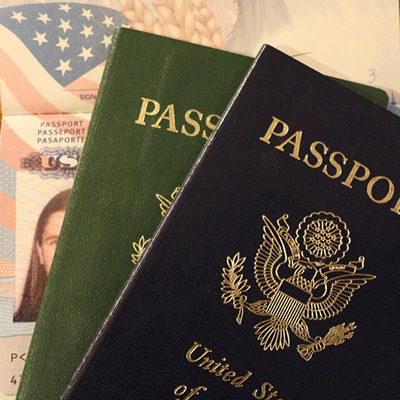How Safe is it for Americans to Live Abroad?
Safety Tips and Resources
By Volker Poelzl

|
|
Having a U.S. passport is generally far more safe than not having one, especially if you respect the host country and follow common sense.
|
When it comes to moving abroad, safety is among the most important concerns we hear about from readers. How safe it is for Americans to live abroad depends largely on the country you choose. Although anti-American
sentiment was on the rise around the globe before the election of Obama — who sought and largely succeeded in repairing the damage done by the previous administration — most locals around the world are peaceful and have little intention of physically harming Americans. Most attacks on American interests and personnel overseas are directed toward government facilities and U .S. military
installations. Rarely tourist destinations, such as hotels, nightclubs, and historic sites have experienced attacks. However, expatriates usually don’t frequent these locations, and they have the advantage of blending in
better with the local culture and people. When living in Rio de Janeiro I never visited the major tourist attractions that invite pickpockets and thieves, and I made a point of dressing down and wearing locally produced clothing.
The best way to prepare yourself for your overseas stay is to carefully research your host country’s economic and political conditions before your departure. Is there a lot of poverty and urban crime? Are there regions
with civil or political unrest? Have rebellions occurred? Living overseas will have some challenges no matter where you go, and by selecting your destination wisely, you can eliminate many security concerns beforehand. Choose a safe part of the country
and a safe neighborhood to live in, and avoid high-profile tourist destinations, but remember that you would do the same in your home country where you moving to a new city or neighborhood! Also, if you are planning to do volunteer work, make sure that foreigners are welcome in this capacity.
The Middle East is arguably the most dangerous destination for Americans and Westerners in general at the moment, and there are several politically unstable countries in Africa and Asia, but most other countries are relatively safe for
American expats. Tragic events that occur are far less frequent than other day-to-day dangers faced at home, statistically. Although Americans living abroad rarely have to fear for their lives, they may still be confronted with political questions and may require a thick skin to deal with criticism of their government and its foreign policies. In
parts of Asia I have found people to be very neutral in their opinions about the United States and Americans, but in South America and Western Europe, American expatriates may find themselves in conversations where they have to stand up to anti-American sentiments. The best defense in such a confrontation is to be well-informed, not only about the foreign policy of the United States, but also about how your host country is affected by it. This is a better approach than touting patriotic
statements or proclaiming the U.S.A. as the world’s greatest country. It also does not hurt to use a bit of self-deprecating humor, as most people around the world are able to separate political leaders and individuals citizens, and deeply appreciate guests who do not visit their land with an air of superiority. Colonial memories remain in the minds of locals, and even in the very architecture and culture of many people around the world.
Check the website of the State Department for travel warnings, as well as advisories created by other Western countries. Read online newspapers from overseas, perhaps an English-language publication in your host country to get
a feel for the local culture and current events, and in the local language if you are conversant. It is important to get a viewpoint from outside the United States to develop a more global perspective on other countries and cultures. In most countries there is some prejudice toward nationals
of certain countries for political, economic, or historical reasons, but keep in mind that in daily life people are not judged merely by their nationality, but also by their attitudes, actions, and interactions with the locals. Knowing the local
language and understanding the culture and people of your host country will endear you to most of the people you meet during your stay abroad.
A lot of safety concerns arise from being unfamiliar with your new surroundings. Making local contacts quickly and seeking support from other expatriates will greatly increase your comfort and safety. Another vital resource
are expatriate clubs and organizations that can help you get settled and adapt to the local life. So much advice for expatriates is scattered across many websites, discussion forums and groups, and social media pages dedicated to living overseas.
If you do your research carefully ahead of time, you will be able to make an informed choice about your destination and stay away from countries that pose a high security risk. And by taking common safety precautions and
following the examples and advice of the locals, you will greatly increase your safety and make your stay overseas more enjoyable. More often than not in modern countries, you are more safe living abroad than at home.
For More Info on Safety Abroad for Americans
Consult before choosing your destination:
Resources for becoming a well-informed global citizen:
|
Volker Poelzl is a Living Abroad Contributing Editor for TransitionsAbroad.com. He has traveled in more than 40 countries worldwide and
has lived in 10 of them for study, research, and work.
|
